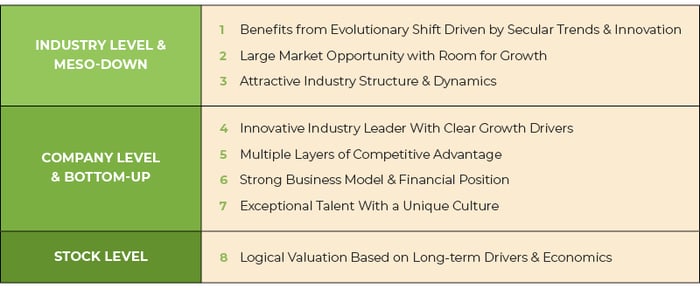Recently, market participants have expressed concern over rising inflation expectations leading to higher interest rates, thus raising input costs, crimping margins, and potentially impacting valuations for some companies. Technology stocks in particular have seen an uptick in volatility and indices such as the Nasdaq Composite have given back some of their gains since peaking in early February.
We certainly acknowledge the rising interest rate environment and how that can impact certain businesses. That said, we believe the improving economic backdrop (a reason rates are moving higher) has a far more significant, and positive, effect on our businesses than the impact of rising rates, which we do not believe will be a significant headwind for our portfolio companies.
Interest rates have been too low for too long, and we believe it’s a healthy dynamic for rates to move to more normalized levels. Additionally, innovative companies, if truly differentiated, have pricing power enabling them to pass along any increase in input costs to their customers, ultimately protecting their margin structure. We believe this dynamic holds true for the companies in our portfolio.
Market volatility and corrections are distracting and often take investors off the long-term prize of building wealth. Investors forget that markets are just places where people come together (electronically, today) to buy and sell stocks, sometimes at higher prices and sometimes at lower prices. While they serve this important function, markets do not create wealth! The stock market is not the engine of economic growth and wealth creation. Innovation is the fuel that powers company, industry, and economic growth over time.
Don’t focus on what the markets are doing; focus on innovation.
At Evolutionary Tree Capital Management, we do not attempt to predict economic cycles or market corrections, as we believe no one can do this, and therefore it is futile. We’re focusing our time on gaining insights into innovations that can sustain growth for portfolio companies.
Innovations, such as cloud computing and biotechnology, also benefit from a dynamic called “secular growth.”
Secular growers are companies that are often able to sustain growth for many years, often regardless of the economic environment. What underpins this sustained growth is that there may be significant room for adoption and market penetration, or there might be a powerful shift from one business model to another, as we see with the shift toward e-commerce, for example. Given that only 15% of US retail sales are conducted online—and there is no reason this can’t triple or more over time—this shift has substantial room to continue, sustaining growth despite what is happening in the broader economy.
Our Investment Philosophy and Investment Criteria Naturally Lead to Secular Growers & Innovation
Every investment in our portfolios is evaluated based on a stringent set of investment criteria. Our research process is built on in-depth research and evaluation into how each business measures up to each criterion listed below. The following investment criteria naturally lead to owning secular growers:
Despite investor concerns about the market, we believe the primary secular trends and innovations driving growth for portfolio companies remain in place over the long term. And, with the recent pullback in “growth oriented” stocks, valuations have become that much more attractive, especially since our expectations for growth across the portfolio holdings has not changed.
Interested in learning more?
Watch the video below in which we discuss innovation as the driver of economic growth as well as whether growth stocks still have room to run and the importance of an innovation allocation.
The content of this call is presented for educational and informational purposes only. Forward-looking statements are not recommendations to buy or sell any security and reflect our own opinions and estimates. Investing in equity securities involves risk and principal loss is possible. Past performance does not guarantee future results.



